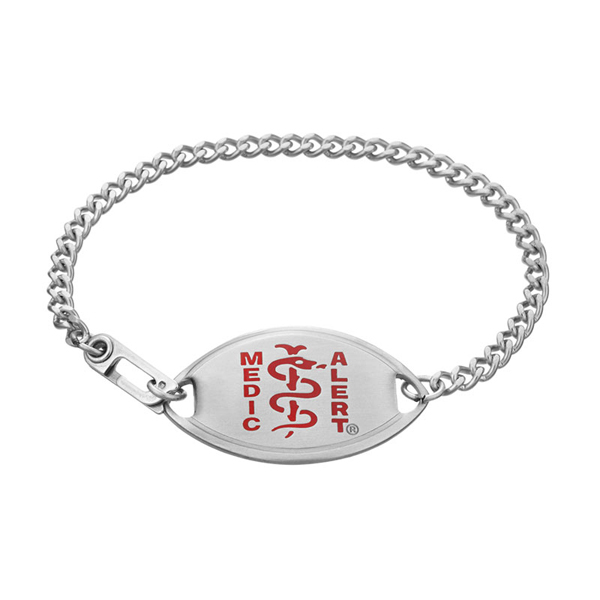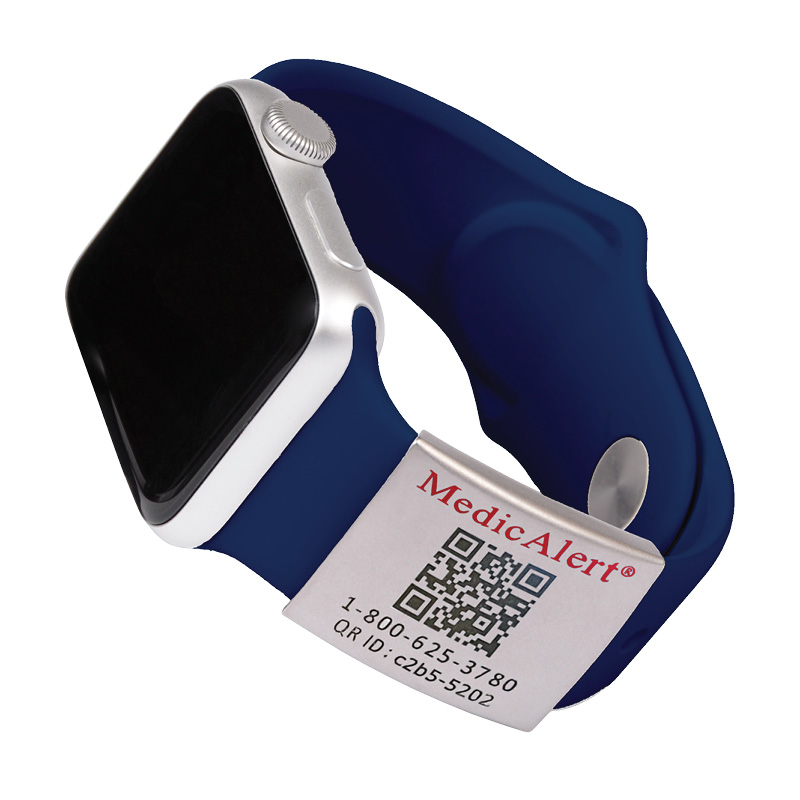
Medical IDs for Amyloidosis
Amyloidosis affects vital organs, so it can be a scary condition to live with in your everyday life. Read below to learn how a medical ID can protect you and your loved ones.
The confidence to live with amyloidosis
Since amyloidosis has so many sub-variants and can affect a diverse range of bodily organs depending on the form of the condition, symptoms related to amyloidosis can differ by type. The most important thing about living with amyloidosis is being well informed about your conditions and ensuring others have the information they need to treat you if necessary.
That’s why a medical ID for amyloidosis is critical for people living with this condition.
How MedicAlert protects those with amyloidosis
One thing you shouldn’t worry about is what could happen if there’s an emergency. MedicAlert’s protection plans offer benefits that extend beyond the ID, providing safety and peace of mind for people living with amyloidosis, their families and caregivers.

24/7 Emergency Response
Our team provides first responders the information they need to provide fast, accurate care.

Digital Health Profile
All your vital information, all in one place for you and your caregiver.

Emergency Contact Notification
In an emergency, we connect families so that no one is alone in a crisis.

Patient Instructions
Share the information that’s important to your care, such as use of rescue medications or contraindication for tests like MRIs.
Pair a medical ID for amyloidosis with the protection plan that’s right for you.
What are the different types of amyloidosis?
Amyloidosis is a broad category for a number of subtypes of the condition. The causes of these subtypes vary. While some are hereditary, others stem from environmental factors such as underlying diseases, or even treatments such as long-term dialysis. Amyloidosis usually involves a similar set of symptoms, but different types of the condition will affect different organs and parts of the body.
The most common form of amyloidosis in developed countries is known as AL amyloidosis, also known as primary amyloidosis. AL stands for “light chain,” and is caused due to the body misfolding proteins, resulting in the accumulation of amyloid. AL amyloidosis can affect the heart, kidneys, liver, and nerves, presenting with a wide range of possible symptoms.
AA amyloidosis is another form of the condition and is usually caused because of inflammation from an underlying disease, such as arthritis. AA amyloidosis typically fades as the underlying illness is treated. Due to this, AA amyloidosis is rarely found in developed countries due to advancements in treatment for inflammatory diseases. AA amyloidosis can affect the kidneys, liver, and spleen.
Other forms of amyloidosis include hereditary amyloidosis, an inherited form of the condition that usually affects the nerves, heart, and kidneys, as well as localized amyloidosis, which only affects a single part of the body, usually the bladder, skin, throat, or lungs. Finally, there is wild-type amyloidosis, which occurs when the liver produces amyloid for reasons that researchers have not currently identified. This form of amyloidosis is most commonly found in men over the age of 70 and usually affects the heart.
Amyloidosis causes and impacts
Causes of amyloidosis vary by subtype, but it generally occurs in combination with other diseases or through genetic conditions. However, some forms of amyloidosis have unknown causes. Risk factors can increase your chances of developing amyloidosis. Most cases of amyloidosis are found in individuals between ages 60-70, and are found in men more often than women. Certain types of amyloidosis are linked to genetically inherited traits. Finally, kidney dialysis, a treatment for kidney failure, can result in an increased chance of developing amyloidosis.
MedicAlert offers free custom engraving on all our amyloidosis bracelets and medical ID products. The engraving on your amyloidosis medical ID should include any critical medical information that can protect and save your life if you are in an accident or have a medical emergency.
What to engrave on your MedicAlert ID for amyloidosis:
- Medical conditions
- Medications
- Implanted devices
- Allergies
- Any other medical information that needs to be communicated to first responders.

Sample engraving. Consult our team if you need help engraving your medical ID for amyloidosis.
Find your medical ID.
How can amyloidosis affect you?
Since amyloidosis has so many sub-variants and can affect a diverse range of bodily organs depending on the form of the condition, symptoms related to amyloidosis can differ by type. Individuals who have amyloidosis may experience swelling in their legs, fatigue, and weakness, shortness of breath even without much exercise or when lying in bed, numbness or tingling in the hands and feet, diarrhea, or constipation.
Other symptoms include blood in the stool, inflammation of the tongue, soreness when swallowing, and an irregular heartbeat. Other symptoms may include weight loss, wrist pain, changes to the coloration of the skin, and easy bruising.
These symptoms can be challenging and frustrating to deal with. Many symptoms of amyloidosis are very uncomfortable and can make ordinary activities difficult. It’s important that you let the people in your life know about your condition so that they can try to accommodate your needs.
Although rare, complications related to amyloidosis can become life-threatening. Since amyloidosis affects your vital organs, the condition can result in extremely dangerous medical crises such as heart failure, kidney failure, and blood pressure regulation. If you feel cardiac amyloidosis symptoms or other symptoms related to vital organs worsening, you should seek medical attention immediately.
Living with amyloidosis? Get peace of mind.
Pair your ID with a MedicAlert Membership.

We'll be your voice. If you can't speak for yourself, your ID will speak for you, informing others about your amyloidosis and any medications you are taking.
We provide 24/7 emergency protection. Our team will relay your critical medical information to first responders in an emergency, no matter where or when it happens.
We keep you connected. You or a loved one should never have to be alone in an emergency. That’s why MedicAlert will reach out to your emergency contacts when needed if you are unable to do so.
We enable you to live with confidence. Enjoy the confidence to live your life with amyloidosis, knowing that MedicAlert is there for you when you need us most.



